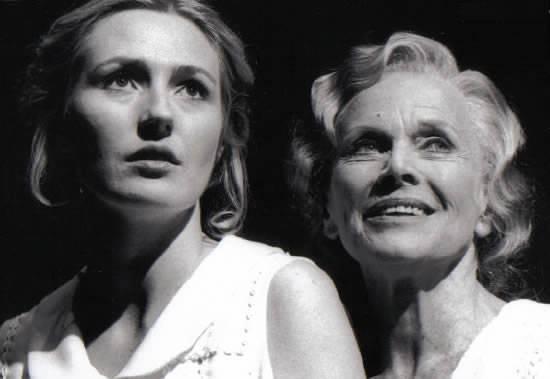
HOW did Honor Blackman come to star in a repertory play at York Theatre Royal in 1999?
As news broke on Sunday of her peaceful passing at 94, thoughts turned back to when The Avengers’ Cathy Gale and Pussy Galore, the “Bond girl” – a term she never liked – played American southern belle Amanda Wingfield in Tennessee Williams’s Depression-era play The Glass Menagerie.
Seventy-four at the time, it was a role the London-born actress had long craved, as Damian Cruden, the artistic director in his second year of cutting a swathe through the Theatre Royal, discovered.
“It all came about because I knew Honor’s agent,” Damian recalled this week. “We had a conversation about the agent’s clients. Various names came up, one of them, Honor Blackman.
“I’d been thinking about doing The Glass Menagerie, and so I said, ‘What about Honor playing Amanda? Would she be interested?’.”
The answer was affirmative, whereupon arrangements were made for Damian to meet Miss Blackman at her London abode. “I can remember going to see Honor at some place in Mayfair, and her instructions were very particular.
“She said, ‘you’ll need to ring the bell, I’ll buzz you in. Then, when you get in the lift, you’ll arrive at what it says is the top floor. The doors will open…but don’t get out. They’ll close again and the lift will bring you up to my flat’.”
What happened? “Exactly that! When the doors opened, I found I was inside her flat! Getting there was just like something out of a Bond movie!” Damian said. “It was a beautiful apartment too.”
Before rehearsals started in the Theatre Royal’s old Walmgate rehearsal rooms – now home to Brew York – Damian had another memorable Honor experience. “I went to see her in her one-woman show, Dishonourable Ladies, in Wales on the Sunday night before we were due to begin, and the deal was I would drive her to York…as it turned out, in her sports car, me driving, while she enjoyed a bottle of champagne! Glorious!”
Damian has fond memories of Miss Blackman’s time in York in autumn 1999. “She was enormously gracious and generous. She had friends coming to her dressing room each night, and liked to have a bottle of champagne in the fridge, but that dressing room didn’t have a fridge until she bought one for it and then gifted it to the theatre. It’s still there in dressing room one, as far as I know!”
As was his custom in his 22 years as artistic director, Damian liked to host meals for his casts at his home. “I cooked a meal on a couple of evenings when The Glass Menagerie cast came round,” he said. “Honor was very straightforward. There were no airs and graces to her.

“I can recall her sitting by the window with my son Felix, who was only three at the time. “My neighbour was standing watching, and I remember him saying, ‘Was that Pussy Galore in your window?’. ‘Yes’, I said. ‘My god, a Bond girl next door,’ he said.”
Damian spoke highly of Miss Blackman’s working relationship with The Glass Menagerie company. “She was great fun and very supportive of young actors, and there were a lot of young cast members in that company,” he said.
“Her performance was great too. Very intelligent, sensitive, mature. There was none of that ‘being starry’ thing about her. She wasn’t aloof. Instead, she enjoyed being part of a group. That was important to her.”
Honor Blackman would return to the York stage in February 2005 in the surprise guest role in The Play What I Wrote, The Right Size comic duo Sean Foley and Hamish McColl’s celebration of Morecambe and Wise. The Press review recorded how Honor’s role was “to be subjected glamorously and good humouredly to humiliation and mockery” at the hands of both the script and comic interjections in the playful Morecambe tradition. She handled it all with elan, of course.
Miss Blackman will forever be remembered for Pussy Galore, from the 1964 James Bond film, Goldfinger. “It is extraordinary. The damned film goes on marching, it doesn’t go out of fashion,” she told the Northern Echo in June 2004, going on to distance her role from the Bond girl stereotype.
“I hate being a Bond girl, because Pussy Galore was a character you would like to play in anything. She was not one of those who fall on their backs straight-away.
“But it was just a part I played, and that is all it was, and it queers your pitch in lots of ways, because people think of you as some sort of femme fatale; they don’t see you as a Shakespearean actress.”
Before Pussy Galore, there was Cathy Gale in The Avengers, and there was more of her in Cathy than in many of her other roles, she suggested.
“When we started, I was the first woman who had ever dared to be equal to a man, intellectually and physically, and the guys who wrote the script were used to writing about women waiting by the kitchen sink or wicked women in black satin,” she said.
“I couldn’t help but be aware of the impact it was having from the fan mail, because women loved it – at last a woman was standing there doing it all herself – and men loved it from quite a different point of view.”
Raise a glass to those memories, whether of Cathy Gale, Pussy Galore or cut-glass Amanda Wingfield in The Glass Menagerie in York in 1999.
Copyright of The Press, York
WHAT DID THE PRESS, YORK REVIEW SAY OF HONOR BLACKMAN’S PERFORMANCE IN 1999?
The Glass Menagerie, York Theatre Royal, until December 4
IN the long, distinguished, purring career of Honor Blackman, Amanda Wingfield was a role she still craved. Likewise, Roger Roger star Helen Grace believed The Glass Menagerie to be the best Tennessee Williams play and she “just can’t tell you” how much she desired to be cast as Amanda’s disabled daughter, Laura.
The Glass Menagerie, a memory play as subtle as silk, absorbing as cotton wool, unexpected as a midnight phonecall, has a habit of hooking you like that, such is its sentimental enchantment: an enchantment that masks a sting as potent as a drowsy wasp in autumn. Williams called it truth in the pleasant disguise of illusion.
The Glass Menagerie, inspired by Williams’ own circumstances, is set in the Depression era St Louis of the 1930s, where former southern belle Amanda is the domineering matriarch, smothering as much as mothering her son Tom (Keith Merrill) and Laura.
Deserted 15 years earlier by her telephone-salesman husband, she clamps her children in the past with her suffocating memories, her fantasies, her anachronistic belief in the tradition of the gentleman caller (Douglas Cockle) and her impossibly romantic hopes of perfect marriages.
Her husband had sought his escape, so too her children – they are in their 20s – but with very different routes in mind. Tom, the narrator and effectively the mouthpiece for Williams himself, is the dreamer, the poet who goes to the movies and drinks “for adventure” and plans a Merchant Marine passage out of working at the dead-end shoe warehouse. Shy Laura, more emotionally crippled than physically disabled (she has a limp), seeks an inward path to safe, fairytale isolation, locking herself away at home with her glass menagerie to avoid the judgement of others.
Theirs is a claustrophobic, unreal world out of step with the times, a contrast emphasised in the superb jagged score of cellist Christopher Madin who juxtaposes the neon brightness of the jazz age with the dimly-lit mournful cello he plays to the side of Liam Doona’s revolving, spinning stage.
Doona’s design adds to the all pervasive presence of Amanda Wingfield, with its see-through walls of muslin drapes allowing you to see into the next room, enhancing the sense of there being no escape from her stifling ways.
Where Sonia Fraser’s Cherry Orchard dragged last month, when there should have been the sense of the sands of time tumbling ever faster, Damian Cruden’s beautifully weighted production captures slow movement, emphasising each nuance of Williams’s subtly shifting writing. He is blessed too with superlative performances: Honor Blackman, a picture of grand illusion; Helen Grace, frail, pale and shyly expressive; Keith Merrill suitably poetic yet pent-up; Douglas Cockle, charming and too worldly for their world.
The finest cut glass indeed.
Charles Hutchinson, November 16 1999
Copyright of The Press, York
